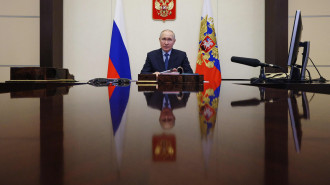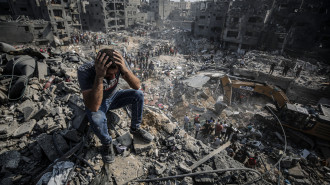
What military options does Hezbollah still have against Israel?

After Israel announced the assassination of Hamas leader Yahya Sinwar on 17 October, Hezbollah said it was entering a new phase in its fight against Israeli forces.
How Hezbollah's new escalatory phase will unfold, however, remains to be seen, especially after facing heavy setbacks since Israel's war on Lebanon was launched.
In mid-September, a series of Israeli attacks broke the tacit rules of engagement established since the conflict between Hezbollah and Israel began following Hamas' 7 October attack on Israel and the war on Gaza.
In a matter of weeks, the pager and walkie-talkie attacks on 17 and 18 September, Israeli strikes deep into Lebanon, including Beirut, from 23 September, the assassination of leader Hassan Nasrallah on 27 September, and Israel's ground invasion have all severely destabilised the Lebanese group.
On the humanitarian side, over 2,400 people have been killed in Lebanon and more than 11,000 injured since 8 October 2023, according to the Lebanese Health Ministry. Additionally, over 1.2 million people have been displaced across the country, the majority in just a matter of weeks.
However, more recently, Hezbollah has been able to repel several Israeli incursions into southern Lebanon while continuing to strike Israel, including a drone attack on an Israeli army base near Binyamina south of Haifa on 13 October, killing four soldiers and injuring 60, along with several attacks targeting Tel Aviv.
The most significant of Hezbollah’s recent efforts to restore deterrence was its drone strike on Israeli Prime Minister Benjamin Netanyahu's private home in Caesarea on 19 October. Netanyahu and his wife were reportedly not present, and there were no casualties.
Three drones were reportedly launched from Lebanon, with two intercepted after crossing into Israeli airspace, highlighting once again a breach of Israeli defences. On the same day, Hezbollah also fired precision-guided rockets at an Israeli base near Haifa, prompting Israeli strikes on Beirut's southern suburbs and Choueifat, southeast of Beirut.
Overnight on the same day, Israel's military struck several branches of the US-sanctioned Al-Qard Al-Hassan Association in Beirut and the Bekaa region, with hundreds of residents fleeing their homes under evacuation orders.
The association has over 30 locations in Lebanon providing interest-free loans under Islamic principles and is widely used as an alternative banking system. Israel accuses it of links to Hezbollah and is expanding its offensive to target non-military institutions believed to be associated with the group.
|
|
All of Hezbollah's recent attacks suggest it is trying to reorganise and restore its deterrence power after major setbacks in September which provided Israel with momentum in its military campaign against the so-called Axis of Resistance, together with the assassination of key figures such as Hassan Nasrallah, Yahya Sinwar, and Hamas' political leader Ismail Haniyeh in Tehran.
However, experts are divided on the extent to which Hezbollah can regroup, reorganise, and re-establish deterrence capabilities.
Joseph Daher, an academic and author of ‘Hezbollah: Political Economy of the Party of God’, told The New Arab that despite going through its most challenging period since its foundation, Hezbollah "remains structured and disciplined, and as Deputy Secretary General Niem Qassem noted, most leaders have been replaced, maintaining their military capacity".
Kassem Kassir, a Lebanese analyst close to Hezbollah, added that Hezbollah’s recent military operations deep into Israel show that the group still possesses deterrence capabilities despite heavy blows,
"The attack on the military base was very significant, as was the missile launch, and there are capabilities that have not yet been revealed," he told TNA.
Other analysts, however, are more circumspect about Hezbollah’s efforts to remobilise.
"They are trying to protect their remaining assets and establish deterrence through missile launches, but their efforts are disorganised,” Hanin Ghaddar, a Friedmann Fellow at the Washington Institute for Near East Policy, told The New Arab.
“Their communications system is still broken. To reorganise, they need to communicate, but each group is acting separately without a command centre."
Despite security breaches and communication degradation, Hezbollah's decentralised military command chain still appears to be functioning, explained Nicholas Blandford, a Hezbollah expert and nonresident fellow at the Atlantic Council.
Each unit is now operating separately and reporting to district commanders responsible for a few villages, he added, with top military leaders overseeing the group.
The Jihad Council, linked to the Shura Council and normally headed by Hassan Nasrallah, handles military decisions, but implementation is decentralised to limit infiltration and adapt to the situation, Daher further explained.
Despite being disrupted, and complicating coordination, the group still appears to have retained communication capabilities through devices unaffected by Israel’s September sabotage operation.
On the ground, meanwhile, the Israeli military is conducting limited hit-and-run operations to uncover Hezbollah infrastructure, moving cautiously to avoid encirclement or ambush.
Hezbollah has repelled several incursions through guerrilla tactics like ambushes, tunnel shafts, and autonomous operations, with nearly 50 Israeli soldiers killed so far and dozens more injured.
However, Israel has captured several Hezbollah fighters, whereas Hezbollah has not yet managed to do the same with Israeli soldiers.
"They may inflict some casualties, but ultimately, Israel is advancing, as shown on maps of the incursions," Ghaddar said.
In its invasion of Lebanon, the Israeli army has repeatedly attacked the UN peacekeeping mission UNIFIL, injuring four peacekeepers, and has launched an intensive air campaign across the country.
These include attacks in the north, killing 21 civilians in Aito, attacks in the Bekaa region, the killing of 16 people, including the mayor, in Lebanon's south municipality of Nabatieh, and the destruction of the historic southern border village of Mhaibib.
Hezbollah, meanwhile, is using short- and mid-range rockets in its aerial counterattacks. In recent days, the group released a video showing the launch of a Nasr-1 precision-guided missile with a 100-km range and a 100-kg warhead, targeting Lid Barracks near Netanya.
|
|
In September, they launched a Qader-1 ballistic missile with a 500-kg warhead. Hezbollah is also reportedly armed with Iranian Fateh-110 missiles (250-300 km range) and Scuds (300-550 km range).
However, in Daher's view, Hezbollah knows it's in for a lengthy battle, which may explain why they aren't using longer-range missiles and are instead relying on middle-range rockets to preserving their stockpile.
"Their goal is to prevent Israel from reoccupying the south and achieve as many battlefield successes as possible, where they have some ground advantage," he added.
Andreas Krieg, a senior lecturer at King's College London and CEO of MENA Analytica, told TNA that the focus of the conflict has shifted to psychological warfare, with Hezbollah increasingly using its full capabilities, including new drones able to penetrate Israeli defences and a rise in missile launches, signalling less restraint in targeting Israel.
"Hezbollah is testing the psychological resilience of the Israeli public, but it's important to note that there is still strong support in Israel for action against Hezbollah. This situation has turned into a psychological war on both sides, where the question is who will be more resilient amid the destructive conflict," he said.
Iran's involvement is primarily political and moral, potentially dissatisfying supporters expecting direct assistance, while Israeli surveillance of arms convoys from Syria complicates weaponry supply. However, if Israel carries out its planned attack, Iran's response could trigger retaliation that involves Hezbollah's capabilities.
Both Iran and Hezbollah are concerned that escalating the conflict could justify a larger war for Israel, whose objectives go beyond what's declared, extending to weakening Hezbollah politically and militarily while disrupting the so-called 'Axis of Resistance.'
Iran, according to Ghaddar, will rebuild Hezbollah only after the war to avoid becoming a target for Israel, and the group is showcasing that it is in the middle of regrouping and reorganising primarily to reassure its community and let Israel know their deterrence is still an issue.
Hezbollah's political strategy to avoid escalation may be influenced by Israel's own escalation, as deterrence appears ineffective, especially given Israel's preparation for a long-term engagement.
However, Israel may struggle to achieve its declared goal of returning over 60,000 displaced citizens to their homes on its northern border. For Hezbollah, enduring Israeli pressure while continuing to fire will hinder the Israeli government's efforts to facilitate the return of the displaced.
At the same time, Krieg noted that "Deputy Secretary General Qassem's focus on applying pressure on Israel may be ineffective, as cornered Israelis under Netanyahu typically escalate".
Although Nasrallah refrained from significant escalation to leverage pressure for a Gaza ceasefire, "Hezbollah must demonstrate sustained pressure on Israel. This shift is evident as they have been using a broader range of capabilities, indicating they are neither coerced nor deterred, suggesting a brutal conflict ahead".
Due to these dynamics, some believe that Hezbollah has lost leverage in potential ceasefire negotiations. However, Blandford explains that the group, militarily, still has precision-guided missiles as a deterrent that may be used if Israel strikes Lebanese infrastructure due to military underperformance in South Lebanon.
On the ground, Krieg argues that Hezbollah hopes to induce war fatigue in Israel by enduring Israeli advances.
Dario Sabaghi is a freelance journalist interested in human rights.
Follow him on Twitter: @DarioSabaghi
![Beirut, Lebanon, after Israeli strikes [Getty]](/sites/default/files/styles/large_16_9/public/2176143035.jpeg?h=38d368d7&itok=tMg_rE5V)
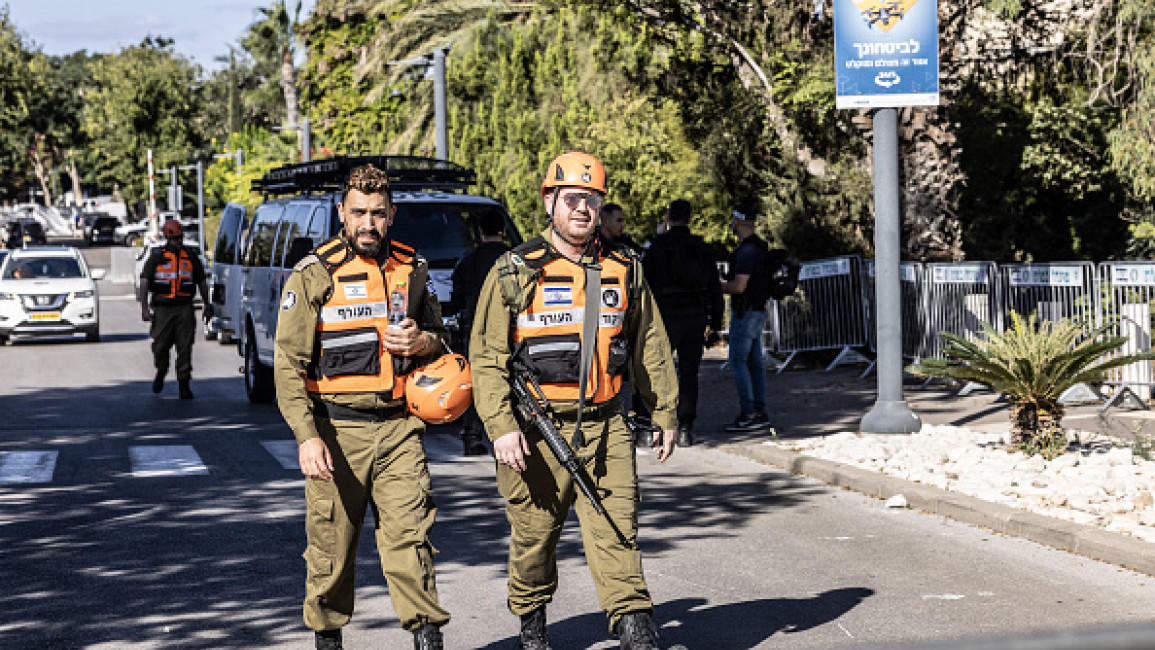
![At least 87 were killed in an Israeli air strike on Beit Lahia in north Gaza [Getty]](/sites/default/files/styles/image_684x385/public/2178754081.jpeg?h=a5f2f23a&itok=rWbrlpHd)
![Trump promised that Lebanese people will be "happy" in the end, in comments made in a rally in Michigan [Getty]](/sites/default/files/styles/image_684x385/public/2112640005.jpeg?h=a5f2f23a&itok=P91hgdKY)
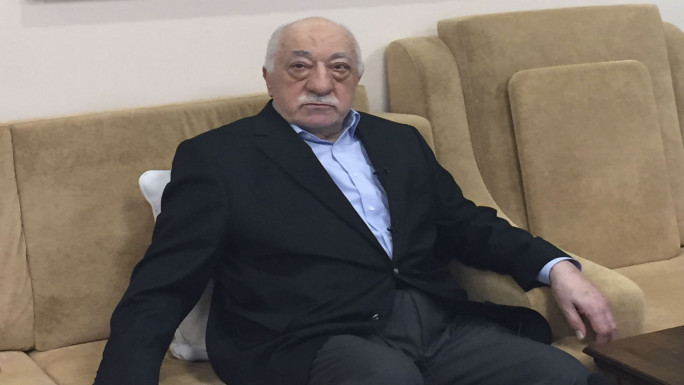
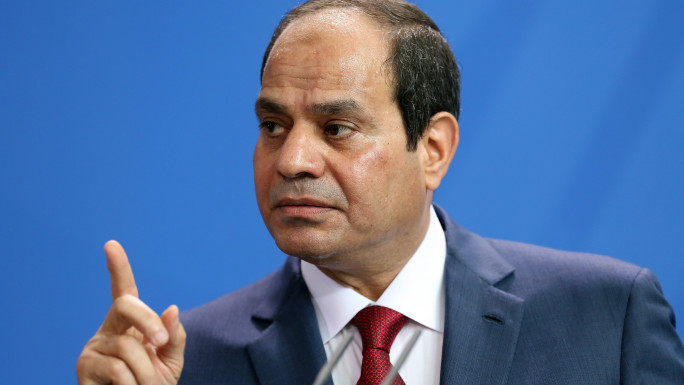
 Follow the Middle East's top stories in English at The New Arab on Google News
Follow the Middle East's top stories in English at The New Arab on Google News
